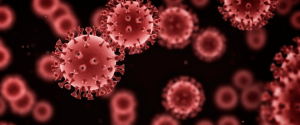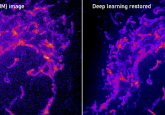Future Science Future Star finalist: Luria Leslie Founou

This year’s stars for the Future Science Future Star Award have been narrowed down to four outstanding finalists. Luria Leslie Founou from the Centre of Expertise and Biological Diagnostic of Cameroon (CEDBCAM; Yaoundé, Cameroon) is a researcher in the field of infectious diseases and antibiotic resistance.
Below, Luria discusses her career, as well as her goals for the future.
Please tell us about your career to date
I am interested in the molecular epidemiology of resistant clinical, foodborne and environmental pathogens, understanding of resistance mechanisms through genomic analyses and state-of-art technologies, as well as prevention and containment measures for antibiotic resistance using the One Health approach. I have over seven years of cumulative research experience on infectious diseases and antibiotic resistance.
I completed my PhD Degree in Pharmaceutical Microbiology – with a strong focus on epidemiology, antibiotic resistance, molecular microbiology and genomics – in 2018 at the University of KwaZulu-Natal (Durban, South Africa). My Ph.D. thesis focused on unraveling the drivers behind the emergence, spread and transmission dynamics of livestock-associated methicillin-resistant Staphylococcus aureus (LA-MRSA) and extended-spectrum beta-lactamase-producing Enterobacterales (ESBL-PE) at the animal, human and environmental interface (One Health) using genomics and state-of-the-art technologies.
 Intellectual – not physical – disability is the second greatest predictor of COVID-19 mortality
Intellectual – not physical – disability is the second greatest predictor of COVID-19 mortality
New research confirms the suspicions of many caregivers around the globe: those with intellectual disabilities are at a vastly increased risk of catching and dying from COVID-19.
I have produced, as first and corresponding author, 12 peer-reviewed articles published in high-impact journals like Frontiers in Microbiology, Pathogens, International Journal of Food Microbiology. I have also been published as the second author in an additional 12 papers in journals including Scientific Reports. My current research focus is on foodborne pathogens, bacterial drug resistance, and maternal and child health in Africa, with a specific interest in the molecular epidemiology and pathogenesis of Group B Streptococcus, methicillin-resistant S. aureus (MRSA), ESBL-PE and other pathogens responsible for serious life-threatening infections in mother and child.
What made you choose a career in your field?
Since childhood, I have always been passionate about health and medical studies. I did not have to lose a relative to know that health is important and precious, it was and it is my passion. I failed several times to enter medical school, so I decided to change track and move to my second choice, biomedical sciences and am without any regrets 13 years later, happier than ever. This field encompasses various sciences, but microbiology is where my heart is. I noticed the multidimensional impact microorganisms could have on human health and this formed the foundation of my Masters and Ph.D. studies.
Nowadays, besides my knowledge of infectious diseases and antibiotic resistance, I take advantage of state-of-the-art technologies (artificial technology, whole-genome sequencing, nanopore sequencing, etc.) to improve maternal, newborn and child health. Here I am able to improve the chances that each woman gets the opportunity to see their progenies live and save the lives of billions of children living in a resource-constrained country. As a mother of two, I realized how precious life is, how we must save each life, and how life-threatening it is to give birth and grow up in a low- and middle-income country.
What have been the main highlights of your career so far?
I discovered and made the first report of the livestock-associated MRSA ST398 in pigs in Cameroon and South Africa. I also provided evidence for the zoonotic transmission of ESBL-PE between pigs and humans in these countries, contributing thereby to new knowledge on the burden and risk factors associated with the emergence and spread of MRSA and ESBL-PE from a developing country perspective. I revealed tremendous gaps in the current state of knowledge about antibiotic use and antibiotic resistance in food animals and humans in Cameroon and South Africa. I made several recommendations to relevant authorities and stakeholders for the effective containment of antimicrobial resistance in order to ensure public health and food safety in these countries.
I have also been awarded several grants including the Cambridge Africa ALBORADA Research Fund 2020, among others.
What is the most difficult challenge you have encountered in your work and how did you overcome it?
The most difficult challenge I have encountered in my work is sexism coupled with racism. It is impossible for me to dissociate these two challenges as a woman of color in a STEM field. I learned that you can do the best, be the best, but not be recognized as the best because of your gender or color. These drastically affected my mental health, motivation and the faith I had in life and in myself. To overcome these challenges, I learned that I have to work at least five times more than others and fail at least hundred times to expect to be considered among the best.
Fortunately, nowadays, racism/sexism do not affect me as in the past – I overcome them by trusting in myself, by having the conviction that I will succeed, by being driven by my passion to contain antibiotic resistance and infectious diseases, while improving maternal and child health in my country and Africa, as well as by the firm confidence to impact significantly those young – and particularly young women – who face or might face similar challenges.
Which publication of yours best highlights your career to date?
I have chosen this article first of all because it is my most cited article with over 300 citations according to Google Scholar (as of 26 June 2021). This paper derived from the merging of an idea of mine with one of my supervisor’s, for us to conduct a perspective and review paper revealing, thereby, that great things come when there is passion and mutual sharing. My passion for this topic drove me to draft this paper within a month and it became my first paper published during the course of my Ph.D. The reviewers’ comments raised during the manuscript’s development only contributed to its excellence and I am very proud to have been able to attend to the reviewers’ queries.
Ultimately, this paper outlined my firm conviction that antibiotic resistance emerging in the food chain is of the foremost importance, especially in developing countries where antibiotic resistance is not only a neglected concern but more so where food safety measures are not adequately implemented. I highlighted the urgent need to consider food safety around the world, in particular in developing countries if we are to successfully contain antibiotic resistance; five years later, food safety is now at the heart of antibiotic-resistance containment strategies and is one of the key components of the strategy to achieve United Nations Sustainable Development Goals by 2030.
Recently, I have been called to serve as an advisory member of the Foodborne Diseases Epidemiology Reference Group II of the World Health Organization (Geneva, Switzerland) despite being an early-career researcher.
What are your main aims for the future?
My main aim for the future is to create a user-friendly diagnostic tool, using a combination of machine learning, microfluidics and nanopore sequencing, that will allow the rapid identification of the foodborne, resistant bacteria responsible for life-threatening infections in pregnant women, neonates and children. This diagnostic tool will need to be coupled with the ability to subsequently provide adequate treatment, another goal of mine.
I hope to construct an efficient and robust machine-learning platform that is able to detect real-time antibiotic-resistant bacteria and antibiotic-resistant genes across various populations and sources. The main motivation here is to reveal the inherent properties of these state-of-the-art data engineering techniques and exploit them for an innovative, effective, reliable, autonomous and cost-effective model for prevention and/or containment of antibiotic resistance.
Where do you hope to see yourself in 5 years?
In 5 years, I see myself as an internationally recognized African women scientist and researcher with knowledge and skills in genomics of antibiotic resistance and infectious diseases, who represents her generation and empowers future generations to engage in a STEM career. I also see myself thriving at the head of an advanced and international research institution hosting groups of early-career and established researchers and performing multidisciplinary research works.
Why do you feel you deserve this award?
In my view, I believe that I deserve this award because my profile, CV and current/future career represent the paradigms that organizations such as the World Health Organization, the Alborada Trust and the Future Science Future Star Award are seeking to support across the developing world. I am further convinced that I deserve this award not only because my current work will ultimately save lives but because I am exactly the type of talent that your organization, through this award, is seeking to retain and encourage in their home country, where early-career researchers are the most vital modernization force. This award will also be very important as it will motivate me to persevere in my work while providing me with further opportunities for my career.





